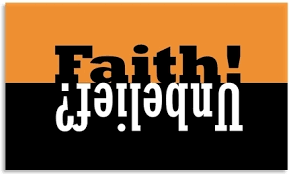John R. W. Stott (1921 – 2011) is known worldwide as a preacher, evangelist, author, and theologian. He wrote this about unbelief:
Unbelief is not a misfortune to be pitied; it is a sin to be deplored. Its sinfulness lies in the fact that it contradicts the Word of the one true God and thus attributes falsehood to Him.
The second warning listed in the Hebrews letter reflects similar passion regarding the danger of unbelief (Heb. 3:7-4:13). Does it begin with drifting (neglect) and ends with doubting (unbelief)?
The writer of Hebrews frequently used Old Testament quotations and images to support their argument for remaining steadfast in the Christian faith. The author cited historical accounts from the Old Testament to remind the readers of the danger of giving in to outside pressure rather than “holding fast to their faith” (Heb. 10:23).
Unbelief for the Hebrews
In this second warning the author outlines the danger of doubting and disbelieving the Word. He uses the background of the exodus of Israel from Egypt and their experiences in the wilderness to explain their unbelief.
It was not God’s will that Israel remain either in Egypt or in the wilderness. His desire was that the people enter their glorious inheritance in the land of Canaan. But when Israel got to the border of their inheritance they delayed because they doubted the promise of God. Therefore, the people went backward in unbelief instead of forward by faith. They missed their inheritance and died in the wilderness.[1]
The “wilderness” for believers today is this current “season of uncertainty”. Instead of the Promised Land, we are facing nonstop change and upheaval in our daily lives. This is a result of many factors affecting our nation including the current health pandemic, social inequalities, and civil unrest. The fallout from this season of uncertainty is fear, disruptions, loss, and fatigue.
Let’s be honest! Our personal faith is also being challenged. We question, “What is God going to do with all these problems?” We object, “When will God intercede on our behalf?” Emotionally and spiritually, we are tired and need to see a “light at the end” of this long tunnel. Can you imagine what it felt like living in the wilderness for 40 years?
21st Century unbelief
What does unbelief among Christians look like today? Unfortunately, it looks like the Israelites’ unbelief in the wilderness. It resembles the behaviors that resulted in the hardening of their hearts.
-
- Distrust in God’s power. We murmur and complain. Although we desire our lives to be trouble free, it just isn’t reality. The reality is this–we live in a fallen world (1John 2:17). There will be trials and tribulations. However, Jesus encouraged us by telling us He has overcome the world (John 16:33). We can trust God’s power to handle whatever happens in our lives.
-
- Dependence on self and others. Scripture warns us “not to be wise in our own eyes” (Prov. 3:7). However, since we distrust God’s power, we tend to seek answers from the world. We foolishly place our trust in human leaders and political agendas. “Instant” access to information through technology makes us believe all our answers can be found on the Internet.
-
- Departure from the “living God”. God was grieved with Israel during the entire forty years because of their unbelief (Heb. 3:12). God is saddened today as He sees the same thing happening with His followers. Their hearts have become hardened. In addition, the deceitfulness of sin has caused believers to rebel against God. They desire to return to their “Egypt”.
Unbelief left unchecked
The danger of unbelief is “loss”. Not the loss of our salvation. The believer in Christ is completely secure (John 10:29; Rom. 8:31-39; Ep. 2:4-10).
However, when we practice unbelief, we miss out on our inheritance today and must suffer the chastening of God (Heb. 3:12-19).
Unbelief is a thief that robs us of the blessings God has promised–promises that are our today (2 Pet. 1: 4). We lose the peace and joy that can only be found in trusting God (Ps. 16:8-9).
Still the best choice
In our humanity, we might be inclined to depend on our own strength. Amid our trials, we might be tempted to try some “nouveau” spiritual approach. The question we must ask ourselves is, “what can be better than Jesus?”
The writer of Hebrews presented the best case for “choosing Jesus” over returning to Judaism. As we look around at the issues we face, our best option is still Jesus.
Jesus, Son of the Living God, possesses all power on heaven and earth (Matt. 28:18). Jesus is omniscient–knowing all things (1 John 3:20). He is omnipotent–unlimited in power and authority (Daniel 4:35). Jesus is omnipresent–in all places at all times (Jer. 23:23-24).
Most importantly, Jesus loves us and has proven His love by dying for us so that we might have eternal life (John 3:16). He is the Righteous and Just One (Deut. 32:3-4). Jesus is all this and so much more. Jesus the Best and Only Choice for all generations
[1] Hebrews, The Wiersbe Bible Commentary

